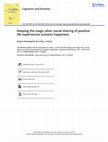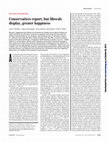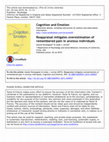Papers by Arpine (Arpi) Hovasapian
The SAGE Encyclopedia of Theory in Psychology

Cognition and Emotion, 2018
Social sharing of positive life experiences has been linked to increased intensity of positive em... more Social sharing of positive life experiences has been linked to increased intensity of positive emotion. Less is known about the relations among sharing, the perceived response of the listener, and the duration of positive emotion. We hypothesised that sharing an experience would sustain positive emotion when listeners responded in a manner that highlighted the appraised importance and remarkability of the experience, thereby slowing hedonic adaptation. College students who received a desirable exam grade (N = 165) reported their emotional response, appraisals, and sharing on the day they received their grade and again the following evening. Sharing was associated with longer episodes of positive emotion and more time spent thinking about the positive event. The association between sharing and emotion duration was greatest when sharing partners were perceived as highlighting the importance and remarkability of the event. This type of sharing also mitigated the fading of emotion intensity over time. These findings suggest that sharing sustains positive emotion by promoting appraisals that "keep the magic alive." ARTICLE HISTORY

Science
Research suggesting that political conservatives are happier than political liberals has relied e... more Research suggesting that political conservatives are happier than political liberals has relied exclusively on self-report measures of subjective well-being. We show that this finding is fully mediated by conservatives' self-enhancing style of self-report (study 1; N = 1433) and then describe three studies drawing from "big data" sources to assess liberal-conservative differences in happiness-related behavior (studies 2 to 4; N = 4936). Relative to conservatives, liberals more frequently used positive emotional language in their speech and smiled more intensely and genuinely in photographs. Our results were consistent across large samples of online survey takers, U.S. politicians, Twitter users, and LinkedIn users. Our findings illustrate the nuanced relationship between political ideology, self-enhancement, and happiness and illuminate the contradictory ways that happiness differences can manifest across behavior and self-reports. SCIENCE sciencemag.org 13 MARCH 2015 • VOL 347 ISSUE 6227

Cognition and Emotion
Anxiety sensitivity, a trait characterised by fear of anxiety-related body sensations, has been l... more Anxiety sensitivity, a trait characterised by fear of anxiety-related body sensations, has been linked to heightened attention to pain, appraising body sensations as threatening, and remembering threatrelated information. We assessed whether individuals with greater anxiety sensitivity overestimate in remembering pain. We also assessed whether emotion regulation strategies that direct attention away from pain (distraction), or alter appraisals of pain (reappraisal), alleviate memory bias. Participants (N = 137) were randomly assigned to one of two emotion regulation conditions or to a control condition before taking part in a cold pressor task. Greater anxiety sensitivity was associated with overestimation in remembering pain. Engaging in reappraisal mitigated this memory bias but engaging in distraction did not. This is the first study to examine the relations among anxiety sensitivity, emotion regulation and memory for pain. The findings suggest that health-care practitioners can encourage reappraisal to promote more positive memories of procedural pain, particularly in patients high in anxiety sensitivity.





Uploads
Papers by Arpine (Arpi) Hovasapian